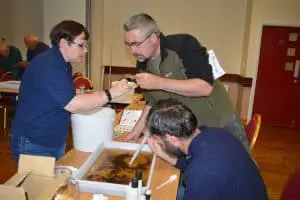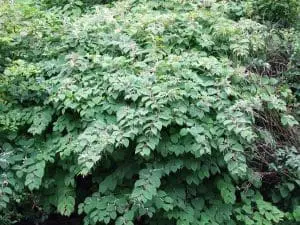Projects
 The Inishowen Rivers Trust aims to support projects that serve to enhance the quality of our rivers and encourage communities to reconnect with their local rivers. The Trust seeks funding on an ongoing basis to provide training and support to local groups.
The Inishowen Rivers Trust aims to support projects that serve to enhance the quality of our rivers and encourage communities to reconnect with their local rivers. The Trust seeks funding on an ongoing basis to provide training and support to local groups.
In 2016 the Inishowen Rivers Trust received support from the Dept of the Environment, Community and Local Government to run two projects – Riverfly Monitoring and Invasive Alien Plants.
Riverfly Monitoring
Riverfly Monitoring is a system of biological monitoring of rivers using a kick sample technique. Volunteers kick the stream bed and catch the disturbed mud and stones in a net. When washed into a tray a whole myriad of river creatures can be found. These ‘riverfly’ are indicators of the health of the stream. Some riverfly will only live in clean waters, whereas others can survive in polluted waters. Trained volunteers can score the quality of the stream based on this simple test. The results are sent back to the IRT where they are kept on record and can provide clues as to problems in the river.
If you would like to find out more about this initiative and how you can get involved please Contact Us.
Invasive Alien Plants
 Invasive plants on our riverbanks is a cause for much concern among groups across Inishowen. In September 2016, the IRT provided an introductory workshop on identification of invasive alien plant species such as Japanese Knotweed, Himalayan Balsam and Winter Heliotrophe. The extent of the problem was outlined to audience and methods of control discussed. The presentation given by Mark Horton is available to download here (Invasive Alien Plants on Inishowen).
Invasive plants on our riverbanks is a cause for much concern among groups across Inishowen. In September 2016, the IRT provided an introductory workshop on identification of invasive alien plant species such as Japanese Knotweed, Himalayan Balsam and Winter Heliotrophe. The extent of the problem was outlined to audience and methods of control discussed. The presentation given by Mark Horton is available to download here (Invasive Alien Plants on Inishowen).
In the autumn of 2017 the IRT received funding through the LA21 Environmental Partnership Fund to carry out an invasive species audit on some rivers in Inishowen. In May 2018 the Trust ran a workshop on the Bredagh River in Moville which focused on the identification and control of the most common invasive plants in Inishowen riparian landscapes. These species include Japanese Knotweed, Himalayan Knotweed, Winter Heliotrope, Salmonberry (Wild Raspberry), Rhododendron and Laurel. Over the summer of 2018, the Trust has gathered information on the distribution of Himalayan Balsam and Japanese Knotweed on selected rivers. In August 2018 the Trust ran a balsam bashing event on the Culdaff River in an area with a heavy infestation of Himalayan Balsam. Further events will be run to raise awareness of the challenges IAS bring to our landscapes and how to effectively manage and control. If you would like to get involved in this type of monitoring please Contact Us.
Natural Water Retention (Flood Management)

In response to the August 2017 floods in Inishowen, the IRT ran an awareness event in February 2018 on Natural Flood Management featuring a selection of national and UK experts. The event, titled ‘Slow the Flow: Managing Flood Waters Naturally’ was attended by over 100 members of the community interested in hearing about how natural flood management is being used in other areas to help alleviate flooding and make landscapes more resilient to climatic change. There were a number of presentations on the night and these can be viewed by clicking on the links after each title.
Dan Turner, Yorkshire Dale Rivers Trust (PDF 5.7MB)
Professor Mary Bourke, Trinity College, Dublin (PDF 6.4MB)
Conor Galvin. OPW (PDF 1.7MB)
Gerry McCafferty & Brendan Maguire, Inland Fisheries ireland (PDF 16MB)
In August 2018 the Trust received funding under the Waters & Communities Office Community Water Development Fund 2018 to further raise awareness of natural water retention measures. The first of these events took place on Sept 29th in Colgan Hall and was titled ‘Restoring Rivers: Flood Management & Eco-Hydromorphology‘ (see News). A second event on ‘Woodlands for Water‘ ran in October 2018, again in Colgan Hall where we heard about the grant schemes available to landowners for planting woodlands. The presentations from these events can be downloaded from our Downloads page.
For the future the IRT hope to continue to raise awareness of how water can be slowed down and stored using natural processes and techniques.
